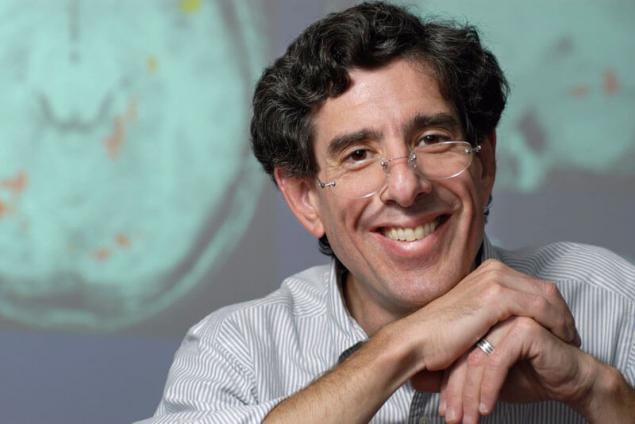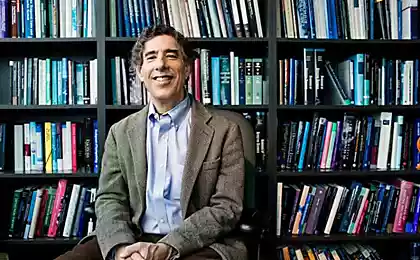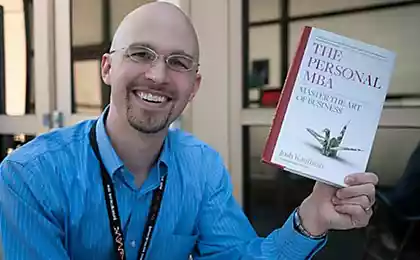584
Richard Davidson: well-being is a skill that can be trained
World famous naroceni Richard Davidson wants you to know three things:
1. You can train your brain so that it varied.
2. These changes can be measured.
3. New ways of thinking can change your brain for the better.
More recently, it sounded like science fiction. Today, the most cited researcher in the world mindfulness practices and his colleagues consider it for granted and continue their cutting-edge experiments at the University of Wisconsin in Madison. About their work they told the correspondent of Mindful magazine (August 2014).

Your brain differs from other organs in your body that it is designed for constant change. "The brain is not static. It changes all the time," says Richard Davidson, Professor of psychology and psychiatry at the University of Wisconsin in Madison. "No matter what we do — learn the game of tennis, or play Words with friends on our phones, we are changing your brain, he says with enthusiasm. — The brain is not a car that goes from the conveyor and remains unchanged (except when it's broken). The brain continues to change throughout our lives." And Davidson thinks that this is very good news.
Why is "neuroplasticity" — is that good news? Let's call one very good reason. The study of Davidson shows that if we are only 30 minutes a day teach your brain to do something different, it brings real results and these changes can be seen on the brain scan, but measured. These studies do 60-65 scientists, doctors of medical Sciences, scientific staff and graduate students in the “research Center for healthy minds” (Center for Investigating Healthy Minds, hereinafter — the Center) in Veysmanom center at the University of Wisconsin in Madison, which Davidson founded in 2008 and became its Director.
"We can consciously set the direction in which plastic changes occur in our brain, says Davidson, sitting in his sun-drenched February office in Madison".
"For example, when we focusareas for a good, healthy mind and accordingly create our intentions, we can potentially influence the plasticity of our brain and effectively change it so that it leads to real improvements in our lives. And it necessarily follows that such qualities as warmth and well-being, you need to recognize skills that can be developed".
Behind the window of his office in the University campus of bottled cold snowy canvas covered in geometric shadows of the building Basmanovskoye center connected with the "Center for the study of healthy thinking" and is located in the neighborhood of the hospital and clinics the University of Wisconsin in Madison.
In the middle of winter here in Madison is bitter cold contrasts with the warmth in the relations between local residents. We should call a cab, as you will ask: "do You mind if the car will have a passenger and you'll split the fee?". During the sessions it seems that the University is literally bursting at the seams, but he manages to keep a homely American spirit. It is not surprising that there is a Center dedicated to the study of meditation practice, and studies of such qualities of our mind, as kindness, compassion and ability to forgive.
The opening of this center marked a personal triumph for Davidson. When he was a graduate student in the mid-1970s, he shocked his professors that went to India to explore meditation practice and Buddhist teachings. After three months spent in India and Sri Lanka. Davidson returned home completely confident that he will deal with the study of meditation.
But his Professor was quickly rid of his illusions, warning that if he has any hopes to build a scientific career, then it is better to abandon thoughts about meditation and follow a more traditional route. So Davidson was a secret practitioner and narochnym who have dedicated themselves to a deep study of human emotions.
According to Davidson, in the early years of the study of meditation not look convincing — it was an extravagant attempt to get the magical results that do not correspond to standard protocols and does not rely on the methodology of previous studies in similar areas.
For example, a study supposedly found the link between surges of crime and activity in practitioners of transcendental meditation in one of the cities for a long time tarnished the study of meditation in General and contributed to continue to keep any of them secret.
He also says that "science and techniques of the time not suitable for studying subtle internal experience." They lacked sophisticated technology such as fMRI (functional magnetic resonance imaging), which allows to obtain a moving picture of brain activity.
They had no understanding of epigenetics — the process by which the structure of our genes can change throughout our lives. “But above all, adds Davidson — we lacked the understanding of neuroplasticity. Now it is a recognized fact: the brain is an organ that changes in response to experience and, most importantly for our studies, in response to exercise". published
P. S. And remember, just changing your mind — together we change the world! ©
Source: www.ustinova.info/blagopoluchie-eto-navyk-kotoryj-mozhno-trenirovat/
1. You can train your brain so that it varied.
2. These changes can be measured.
3. New ways of thinking can change your brain for the better.
More recently, it sounded like science fiction. Today, the most cited researcher in the world mindfulness practices and his colleagues consider it for granted and continue their cutting-edge experiments at the University of Wisconsin in Madison. About their work they told the correspondent of Mindful magazine (August 2014).

Your brain differs from other organs in your body that it is designed for constant change. "The brain is not static. It changes all the time," says Richard Davidson, Professor of psychology and psychiatry at the University of Wisconsin in Madison. "No matter what we do — learn the game of tennis, or play Words with friends on our phones, we are changing your brain, he says with enthusiasm. — The brain is not a car that goes from the conveyor and remains unchanged (except when it's broken). The brain continues to change throughout our lives." And Davidson thinks that this is very good news.
Why is "neuroplasticity" — is that good news? Let's call one very good reason. The study of Davidson shows that if we are only 30 minutes a day teach your brain to do something different, it brings real results and these changes can be seen on the brain scan, but measured. These studies do 60-65 scientists, doctors of medical Sciences, scientific staff and graduate students in the “research Center for healthy minds” (Center for Investigating Healthy Minds, hereinafter — the Center) in Veysmanom center at the University of Wisconsin in Madison, which Davidson founded in 2008 and became its Director.
"We can consciously set the direction in which plastic changes occur in our brain, says Davidson, sitting in his sun-drenched February office in Madison".
"For example, when we focusareas for a good, healthy mind and accordingly create our intentions, we can potentially influence the plasticity of our brain and effectively change it so that it leads to real improvements in our lives. And it necessarily follows that such qualities as warmth and well-being, you need to recognize skills that can be developed".
Behind the window of his office in the University campus of bottled cold snowy canvas covered in geometric shadows of the building Basmanovskoye center connected with the "Center for the study of healthy thinking" and is located in the neighborhood of the hospital and clinics the University of Wisconsin in Madison.
In the middle of winter here in Madison is bitter cold contrasts with the warmth in the relations between local residents. We should call a cab, as you will ask: "do You mind if the car will have a passenger and you'll split the fee?". During the sessions it seems that the University is literally bursting at the seams, but he manages to keep a homely American spirit. It is not surprising that there is a Center dedicated to the study of meditation practice, and studies of such qualities of our mind, as kindness, compassion and ability to forgive.
The opening of this center marked a personal triumph for Davidson. When he was a graduate student in the mid-1970s, he shocked his professors that went to India to explore meditation practice and Buddhist teachings. After three months spent in India and Sri Lanka. Davidson returned home completely confident that he will deal with the study of meditation.
But his Professor was quickly rid of his illusions, warning that if he has any hopes to build a scientific career, then it is better to abandon thoughts about meditation and follow a more traditional route. So Davidson was a secret practitioner and narochnym who have dedicated themselves to a deep study of human emotions.
According to Davidson, in the early years of the study of meditation not look convincing — it was an extravagant attempt to get the magical results that do not correspond to standard protocols and does not rely on the methodology of previous studies in similar areas.
For example, a study supposedly found the link between surges of crime and activity in practitioners of transcendental meditation in one of the cities for a long time tarnished the study of meditation in General and contributed to continue to keep any of them secret.
He also says that "science and techniques of the time not suitable for studying subtle internal experience." They lacked sophisticated technology such as fMRI (functional magnetic resonance imaging), which allows to obtain a moving picture of brain activity.
They had no understanding of epigenetics — the process by which the structure of our genes can change throughout our lives. “But above all, adds Davidson — we lacked the understanding of neuroplasticity. Now it is a recognized fact: the brain is an organ that changes in response to experience and, most importantly for our studies, in response to exercise". published
P. S. And remember, just changing your mind — together we change the world! ©
Source: www.ustinova.info/blagopoluchie-eto-navyk-kotoryj-mozhno-trenirovat/























